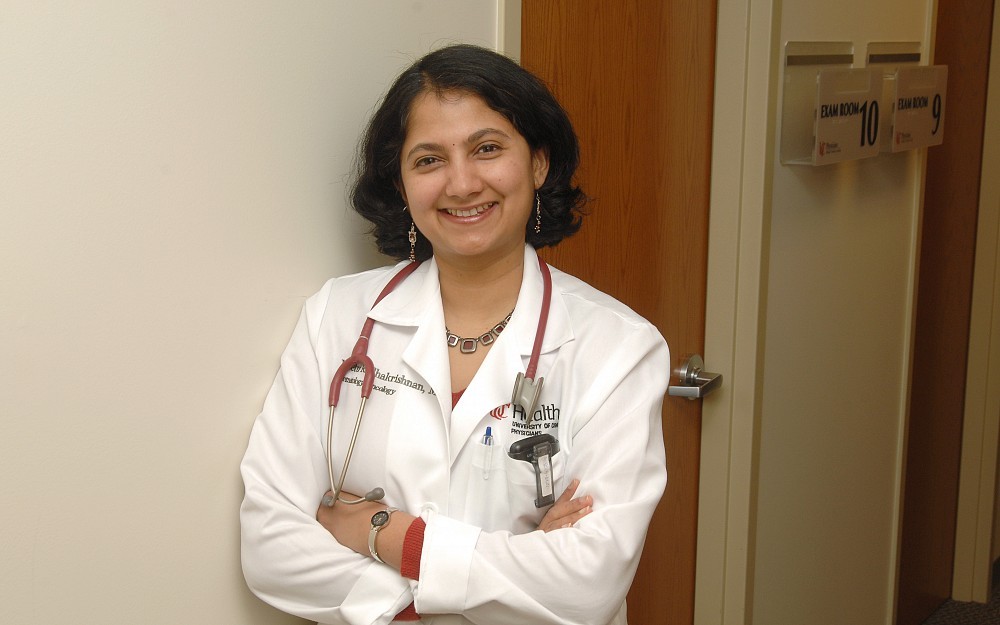
UC HEALTH LINE: The Truth and Myths About Breast Cancer Risk Factors
CincinnatiEvery day, science gives us new tips to help navigate our personal health journeys. With such a plethora of information available at the click of the mouse, that gold mine of knowledge can quickly feel like a maze of confusing advice.
UC Healths Mahmoud Charif, MD, and Neetu Radhakrishnan, MD, say when it comes to breast cancer there are several key messages that every womanregardless of age or ethnicityshould absorb in regard to understanding and managing her risk.
Here, they debunk some of the most common myths about breast cancer:
· MYTH: Most women who develop breast cancer are genetically predisposed, so I cant do anything to manage my risk. According to Charif, most women who develop breast cancer actually do not have a family history of the disease or a genetic mutation linked to breast cancer (such as BCRA1 or BCRA2). Breast cancer risk, he says, is affected by a combination of both lifestyle choices and environmental exposures.
"Statistics tell us that one in eight women will develop breast cancer during her lifetimeand that risk goes up significantly with age and genetic predisposition, says Charif, a UC Health medical oncologist and assistant professor at the UC College of Medicine. "The good news is that there are many proactive lifestyle choices every woman can make to reduce her risk.
Those choices include: avoiding alcohol consumption; eating a healthful diet with emphasis on fruits, vegetables and whole grains; regular exercise; and maintaining a healthy weight.
· MYTH: Certain foodslike red meatincrease your risk for cancer. Scientific studies have not linked any specific foods to an increased breast cancer risk. What has been shown to increase that risk is regular consumption of alcoholeven in moderation.
"I tell my patients to abstain from alcohol entirely. Consuming one drink per day increases the average womans breast risk by approximately 10 percent, adds Charif. "Alcohol intake also has been linked to several other cancers, including oral, throat, esophagus and liver.
Studies on eating and drinking soy have been inconclusive with no clear evidence of benefit or harm,
"The best advice is to eat a healthful, balanced diet and discuss any radical diet changesincluding the addition of supplements or multivitaminswith your physician, adds Radhakrishnan, a UC Health medical oncologist and assistant professor at the College of Medicine. "When it comes to soy specifically, since no study has shown harm, it is probably safe for a healthy woman to consume soy in amounts common to Asian diets .
· MYTH: Lumps or pain in the breast are always cancer. Breast tissue changes frequently due to varying hormone levels in the bodyfor example, during a womans menstrual cycle or lactation. Lumps can be benign overgrowths of breast tissue; however, any palpable lump should be examined by a medical professional immediately. Mammograms, breast biopsies and other tests can aid in diagnosis.
· MYTH: Hormone replacement therapy is harmless. Studies have shown that combination hormone replacement therapy (estrogen/progesterone)used frequently in the 1990s to treat symptoms of menopauseactually increases the risk of breast cancer. Charif cautions women dealing with menopausal symptoms to avoid combination HRT entirely if possible; estrogen-only HRT slightly increases the risk for breast cancer if used for five years of less.
"Breast cancer risk is associated with lifetime exposure to the female hormone, estrogen. This is why women who have had children or have breast fed for an extended period are thought to be at modestly reduced risk for breast cancerboth those activities reduce a womans lifetime exposure to ovulation and therefore estrogen, explains Charif.
"Early menstruation and late menopause are also associated with an increased risk for breast cancer for the same reason, adds Radhakrishnan.
· MYTH: I have to be an avid exerciser for it to reduce my breast cancer risk. Even moderate exerciselike brisk walking three or four times a weekcan have an impact on breast cancer risk in addition to improving cardiovascular health. The important thing is to keep moving. Studies show that regular exercise can help reduce the risk of breast cancer in women by anywhere from 20 To 50 percent.
UC Healths multidisciplinary breast cancer teammade up of fellowship-trained surgical oncologists, medical oncologists, radiation oncologists, reconstructive surgeons, radiologists, pathologists, genetics specialists and a highly experienced oncology nursing staff meets regularly as a group to discuss and determine the best treatment plan for women affected by breast cancer.
Appointments with hematology-oncology are available in West Chester and Clifton and can be made by calling (513) 475-8500. For a full list of UC Health cancer specialists, visit ucphysicians.com.

Mahmoud Charif, MD
Related Stories
The latest efforts in cervical cancer prevention
May 12, 2025
Medical Laboratory Observer interviewed the University of Cincinnati Cancer Center's Leeya Pinder to discuss the current state and future of cervical cancer prevention.
Study links adverse childhood experiences to higher risk of...
May 12, 2025
Children who have been exposed to adverse childhood experiences face an increased risk of homelessness during their childhood, according to a new study from a researcher in the University of Cincinnati’s School of Social Work.
Ohio could soon make breast cancer screenings more affordable
May 9, 2025
The University of Cincinnati Cancer Center's Ann Brown was featured in Local 12 and Cincinnati Enquirer reports on a bill introduced by Rep. Jean Schmidt in the Ohio legislature that seeks to eliminate out of pocket medical expenses such as copays and deductibles associated with supplemental breast cancer screenings.
